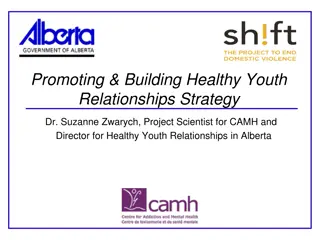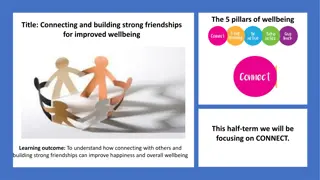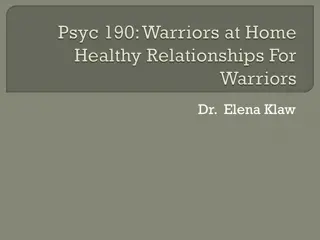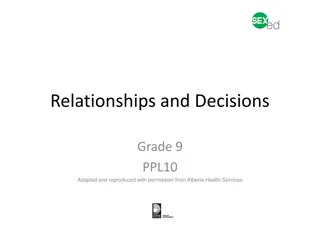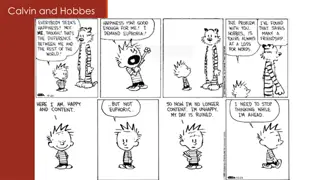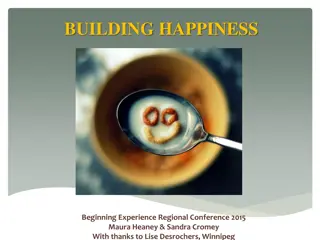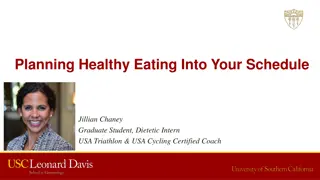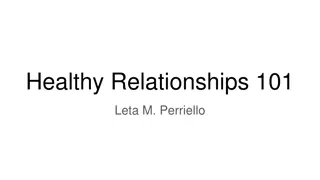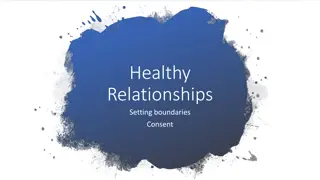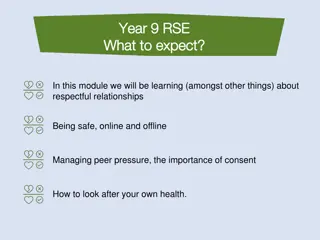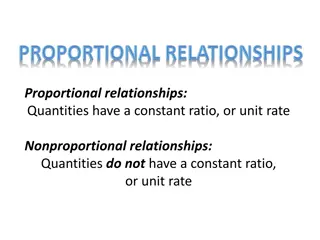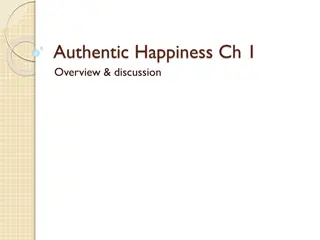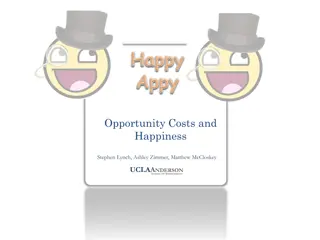Understanding Healthy Relationships for Lasting Happiness
Exploring the components of healthy relationships, this content delves into the key characteristics and behaviors that make a relationship thrive. It discusses the importance of communication, boundaries, and mutual respect in fostering a positive partnership. By examining the dynamics of relationships, readers gain insights into building strong connections and maintaining long-lasting happiness.
Download Presentation

Please find below an Image/Link to download the presentation.
The content on the website is provided AS IS for your information and personal use only. It may not be sold, licensed, or shared on other websites without obtaining consent from the author. Download presentation by click this link. If you encounter any issues during the download, it is possible that the publisher has removed the file from their server.
E N D
Presentation Transcript
Date: Title: Maintaining Healthy Relationships 1. Draw and write what you think a healthy relationship looks like. What does a healthy relationship look like? Who are the main characters in a healthy relationship? Label your characters Label them with they key characteristics
What are the most important things that a relationship needs? Write three sentences to explain your ideas Include the following vocabulary: 1. Relationship 2. Healthy relationship 3. Boundaries CHL: Can you explain why these features are so important?
What matters to you in a relationship? For each statement, decide how much you agree using the scale to help you. 1 = completely disagree, 2 = partially disagree, 3 = neither agree or disagree, 4 = partially agree, 5 = completely agree For each, explain why you believe what you do. 1. There is always likely to be one more dominant person in any relationship. 2. The most important thing in a relationship is to make your partner happy, no matter what. 3. Everyone has a soulmate and dating is about trying to find the one . 4. Being able to compromise is better than always getting your own way. 5. A person s personality is more important than their looks. 6. You should compromise on your boundaries if they make the other person uncomfortable. 7. If they loved me, my partner would know what I wanted without being told.
Features of a relationship Look at the six possible features of a relationship below. In pairs, decide how each feature could be either healthy or unhealthy as part of a relationship. Spending time together Knowing each other s family and friends Having lots in common Being open and honest Humour Never having an argument CHL: Can you explain how any of these features might link to personal boundaries?
1. Spending time together: Making time for each other is a good thing it helps to strengthen relationship bonds. However, spending almost every moment together can be unhealthy because it reduces contact with friendship and family networks. Someone making their partner feel guilty for spending time with others could be controlling the relationship. 2. Knowing each other s family and friends: Connecting the people you care about can deepen and strengthen relationships. But rather than assuming introductions should take place early on, it is important that this is done at a pace both parties agree with. If family or friends find out about a relationship before both parties are ready, there can be a lot of pressure. Or if a breakup occurs in a friendship group then it can be particularly difficult, since managing this requires both parties to be mature and thoughtful. 3. Having lots in common: Common interests can be what initially sparks a connection with someone, and maintains that connection over time. When couples spend quality time together, it helps to strengthen relationship bonds. However, if the couple spend almost every moment together then this can be unhealthy. Healthy couples maintain a balance between time spent together and with others.
4. Being open and honest: Honest communication is healthy. However, being brutally honest is often disrespectful and can damage the receiver s self-esteem. For example: rather than telling someone that you hate their cooking and will never eat anything they make again, it is more loving to offer to cook because you feel you are quite good in the kitchen. 5. Humour: Finding things to laugh at together is healthy it helps couples to connect. However, humour directed at a partner which goes too far can damage their self-esteem and is disrespectful. 6. Never having an argument: Getting on so well that you rarely argue can be a sign of a good relationship. However, it could also be a sign that one or both parties are not communicating their wants and needs or that they are being dominated by the other person. Good relationships involve negotiation so sometimes it is healthy.
Riley and Frankie Task: Choose one of the characters in the case study and to reflect on different aspects of their response to the case study. Riley and Frankie started dating six months ago and really enjoy each other s company. They walk to and from school together, are in most of the same lessons and both go to drama club after school. They have the same taste in music and spend loads of time online sharing videos and photos. Riley is really keen to take the next step in their relationship and wants Frankie to meet their family, but every time Riley suggests it, Frankie changes the subject and won t give a definite answer. Riley is getting more and more frustrated about it and has started teasing Frankie about little things, like choice of clothes or silly comments. Frankie isn t really sure what s wrong with Riley, so is becoming more withdrawn and quiet when they re together. On the way home from school yesterday, Frankie wanted to go over to Samira s instead of coming back to Riley s. This led to a huge argument in the street and Riley ended up grabbing Frankie s wrist and saying Frankie shouldn t go to Samira s house. Now neither of them are speaking. Head: What is the character thinking about? Heart: How does the character feel in this relationship? Hands: What should the character do next? Mouth: Who can the character talk to for help and advice? What might they say? Boot: What does the character need to give the boot? This might be a belief, behaviour or worry that the character will be better off without.
Riley and Frankie Riley and Frankie started dating six months ago and really enjoy each other s company. They walk to and from school together, are in most of the same lessons and both go to drama club after school. They have the same taste in music and spend loads of time online sharing videos and photos. Riley is really keen to take the next step in their relationship and wants Frankie to meet their family, but every time Riley suggests it, Frankie changes the subject and won t give a definite answer. Riley is getting more and more frustrated about it and has started teasing Frankie about little things, like choice of clothes or silly comments. Frankie isn t really sure what s wrong with Riley so is becoming more withdrawn and quiet when they re together. On the way home from school yesterday, Frankie wanted to go over to Samira s instead of coming back to Riley s. This led to a huge argument in the street and Riley ended up grabbing Frankie s wrist and saying Frankie shouldn t go to Samira s house. Now neither of them are speaking. Imagine you were Riley and Frankie s friends and had witnessed this argument. What would you say to each of them? What relationship values is each character holding and how is it affecting their behaviour?
What are the most important things that a relationship needs? Add one new idea about the most important thing in a relationship to your explanation from earlier in today s lesson. honesty


